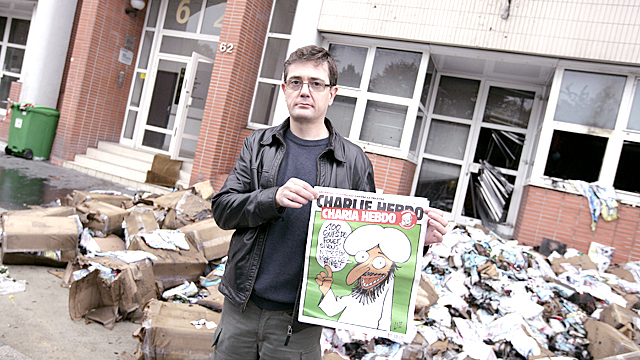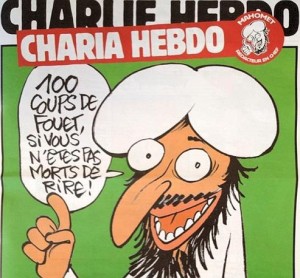“100 Lashes if You Don’t Die Laughing”
The Paris offices of the satirical French magazine Charlie Hebdo were destroyed in an arson attack after it “invited” the Islamic Prophet Mohammed to be its “guest editor.”
“100 Lashes if you Don’t Die Laughing”
Soeren Kern | Hudson NY | November 3, 2011
The Paris offices of the satirical French magazine Charlie Hebdo were destroyed in an arson attack after it “invited” the Islamic Prophet Mohammed to be its “guest editor.”
The November 2 firebombing attack took place just hours before the magazine’s current issue — titled “Sharia Hebdo” (a reference to Islamic law) and featuring a cartoon of Mohammed on its cover — hit the news stands.
The attack marks a serious escalation of a long-running Islamic war on free speech and expression in Europe. In recent years, Muslim immigrants and their leftwing multicultural supporters in Europe have used a combination of lawsuits, verbal and physical harassment and even murder to silence debate about the rise of Islam in Europe.
The editors of Charlie Hebdo magazine said Mohammed was named as “guest editor” to “honor” the recent electoral success of the Islamist Ennahda party in Tunisia and the announcement by the new leaders of Libya that Islamic Sharia law would be the basis for the country’s legal system.
The front cover of the offending issue portrayed a cartoonish man sporting a turban, white robe and beard and smiling broadly while saying “100 lashes if you don’t die laughing.”
Page two of the issue contains a series of cartoons featuring women in burqas, the face-covering robes. Page three has a tongue-in-cheek editorial — signed by “Mohammed” — which states that the true aim of Tunisia’s Islamist Ennahda party (which won the country’s first free elections on October 23) is to impose Islam not democracy.
Every other page of the issue contains “a word from Mohammed” and spoofs the news by twisting it into the weekly’s current theme.
The magazine’s publisher, a cartoonist known as Charb, said the fire was caused by Molotov cocktails. He told police that some of his employees had received threatening letters and emails in an apparent effort to prevent the issue from reaching newsstands. Charb also said the magazine’s website had been hacked and that visitors were directed to an Islamist website.
But Charb rejected accusations that he was trying to provoke. “It was a joke where the topic was to imagine a world where Sharia would be applied,” Charb said. “But since everyone tells us not to worry about Libya or Tunisia, we wanted to explain what would be a soft version of Sharia, a Sharia applied in a soft manner. We feel we are just doing our job as usual. The only difference is that this week, Mohammed is on the cover and that is quite rare,” Charb said.
French Prime Minister François Fillon said “Freedom of expression is an inalienable value of our democracy. No cause can justify a violent action.”
Interior Minister Claude Guéant said “Everything will be done to find those behind this attack. If some think they can impose their way of thinking on the [French] Republic, they are mistaken, they will be fought.”
Paris Mayor Bertrand Delanoë condemned “this demonstration of hate and intolerance” and promised to find new office space to help the magazine continue publishing after the blaze.
French Muslim leaders, while distancing themselves from the attack, said it was justified.
Mohammed Moussaoui, head of the French Council for the Muslim Faith, an umbrella group representing the more than 5 million Muslims in France, said his organization deplores “the very mocking tone of the paper toward Islam and its prophet but reaffirms with force its total opposition to all acts and all forms of violence.”
Dalil Boubakeur, who heads the Great Mosque of Paris, said he resented the “anxious European climate of Islamophobia” and the stigmatizing of Muslims through caricatures.
The incident is the latest salvo in a long-running effort to silence criticism of Islam in Europe, often through acts of violence.
In 2002, Dutch politician Pim Fortuyn was assassinated for his views on Muslim immigration, and in 2004, Dutch filmmaker Theo van Gogh was stabbed to death for producing a movie that criticized Islam.
In September 2005, the Danish newspaper Jyllands-Posten published a dozen cartoons of the Muslim prophet, including one depicting Mohammed wearing a turban shaped like a bomb with a lit fuse. The cartoons ignited violent protests across the Muslim world, resulting in more than 100 reported deaths.
In 2010, Kurt Westergaard, the Danish artist who drew the offending cartoons, narrowly escaped being assassinated by an axe-wielding Muslim in Aarhus, Denmark’s second-largest city.
In many other cases, the preferred method of silencing contrary views of Islam in Europe has been lawfare, the malicious use of European courts.
In June 2011, a court in Amsterdam acquitted Geert Wilders — the leader of the Dutch Freedom Party who had denounced the threat to Western values posed by unassimilated Muslim immigrants — of charges of inciting religious hatred against Muslims for comments he made that were critical of Islam.
The charges against Wilders arose in part from a short film called “Fitna” (an Arabic word with connotations of upheaval or chaos) which he produced in 2008. The 17-minute documentary — which argues that the Koran incites its followers to carry out acts of violence and terrorism — prompted sundry leftist and Islamic groups to file more than 60 complaints with the Dutch police.
Also in the Netherlands, Gregorius Nekschot, the pseudonym of a Dutch cartoonist who has been a vocal critic of Islamic female circumcision and often mocks Dutch multiculturalism, was arrested at his home in Amsterdam in May 2008 for drawing cartoons deemed offensive to Muslims. Nekschot (which literally means “shot in the neck,” a method used, according to the cartoonist, by “fascists and communists to get rid of their opponents”) was released after 30 hours of interrogation by Dutch law enforcement officials.
In an interview with the Dutch newspaper de Volkskrant, Nekschot said it was the first time in 800 years of the history of satire in the Netherlands that an artist was put in jail. (That interview has since been removed from the newspaper’s website.)
Other recent assaults on Islam-related free speech in Europe include the show trials of: Elisabeth Sabaditsch-Wolff, a housewife in Austria, Susanne Winter, a politician in Austria, Lars Hedegaard, a journalist in Denmark, Jesper Langballe, a politician in Denmark, Jussi Kristian Halla-aho, a politician in Finland, Brigitte Bardot, an animal rights activist in France, Michel Houellebecq, a novelist in France, and the late Oriana Fallaci, a journalist and author in Italy.
Back in France, the last page of the offending magazine features a turbaned and bearded man with a clown-like red nose who says: “Yes, Islam is compatible with humor.” Unfortunately for Charb the editor and many other champions of free speech in Europe, Islam is no joke.
Originally published by Hudson New York on November 3, 2011





